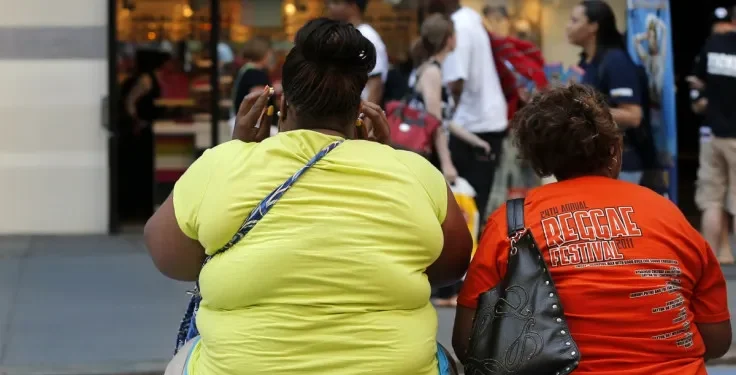Obesity in South Africa: A nation at risk
‘From misallocated health funds to the normalisation of ‘family diabetes’, South Africa’s obesity epidemic demands a multi-pronged approach. We need policy changes, community-driven initiatives and a redefinition of our relationship with food to create a healthier future’
By Aphelele Mtwecu
NEARLY two months ago, most of us set out our yearly goals to either get fit and/or lose weight. Are you still hanging in there? No shame, though. We are all in this together, navigating the ups and downs of this journey through trial and error. After all, the Soweto Towers weren’t built in a day, and neither is a healthier lifestyle.
As an overweight person (working on it, I promise!), according to the Body Mass Index (BMI) , this hits home for me primarily when looking at our South African reality. In our country, approximately 70 per cent of women and 40 per cent of men are either overweight or obese, according to the South African Medical Research Council Even more alarming, childhood obesity rates have doubled in the last decade, with nearly 1 in 5 South African children now classified as overweight or obese.
The dormant epidemic
As our health sector grapples with the recent halting of HIV-related funding through USAID under the [Donald] Trump administration, many might still consider HIV our biggest health hurdle. On the contrary, diabetes has quietly become a major killer in South Africa. According to the University of the Witwatersrand, it is now South Africa’s second-leading cause of natural death after tuberculosis, claiming more than 30,000 lives annually.
It is important for us to look beyond just pursuing socially acceptable bodies and understand the real health implications at stake. According to the University of Pretoria’s diabetes research University of Pretoria’s diabetes research , the condition affects at least 4.5 million South Africans, with many more cases undiagnosed and untreated. What is more concerning is the connection between mental health and diabetes that often goes overlooked, creating a dangerous cycle of worsening physical and cognitive health.
What is particularly concerning is how diabetes has become normalized in our communities. We have accepted the narrative that ‘it runs in the family’, closer to home ‘unesigulo sabantu abadala’ without questioning why it is so prevalent among us. We need to take stock of the dire consequences, ranging from liver disease, kidney failure, blindness, amputation, and in many cases, death. These are not just statistics – these are our parents, uncles, friends, and increasingly, our children.
Interwoven factors
South Africa’s obesity crisis doesn’t affect all communities equally. Black South African women rank highest in the statistics, with nearly 80 per cent classified as overweight or obese according to the most recent Demographic and Health Survey Demographic and Health Survey. This isn’t by chance – it’s tied to our complex history, socio-economic realities, and cultural relationships with food.
Traditionally, many people have held views that associate fuller figures with dignity, respect, and honour. In contrast, slimmer individuals are often viewed through the lens of contemporary beauty standards and health considerations, which continue to shape perceptions in many Black communities. Compounding this issue is the reality of food apartheid, where historically disadvantaged areas lack access to affordable and nutritious food options. Together, these factors create a complex and challenging situation.
Addressing nutrition poverty
Here is the oxymoron that puzzles all of us: South Africa simultaneously faces significant food insecurity food insecurity (with roughly 30 per cent of households experiencing inadequate or severely inadequate access to food according to Stats SA) while obesity rates are mounting
What are we missing?
This contradiction becomes clearer upon closer examination. The issue is not simply hunger; it is a lack of nutritious food, often known as “nutrition poverty.” In township areas, energy-dense but nutrient-poor foods are typically the most affordable and easily accessible options. A study conducted in 2022 by the Pietermaritzburg Economic Justice and Dignity Group revealed that in low-income areas, a nutritious food basket costs 30 per cent more than in wealthier neighbourhoods. When trying to make ends meet with limited funds, items like a loaf of white bread and fried chips provide more calories for the same amount of money compared to fruits and vegetables.
This economic pressure to prioritise calories over nutrition ultimately takes a toll on the long-term health and well-being of these communities.
Beyond individual will
We need to shift away from the narrative that places the burden of healthy eating solely on individuals, while systemic delays in transforming South Africa’s food chain and supply keep nutritious food out of reach for many. A growing epidemic of obesity, diabetes, and other lifestyle diseases is the result of a lack of access to healthy options.
Take the Health Promotion Levy (HPL), for example. Introduced in 2018, this tax on sugary drinks was meant to reduce rising health issues and fund health promotion initiatives. It was positioned as part of the Department of Health’s plan and is collected by SARS, with the revenue intended to support health promotion initiatives. But what happened in practice? According to a report by the University of the Witwatersrand, as of June 2022, over R24 million had been raised through the levy, yet in the 2019/2020 financial year, only R14 million was allocated to actual health promotion. Where the rest of the money went is another tale. However, what this vividly tells us is the undeniable lack of political will to prioritize public health.
South Africans are facing a challenging economic climate that forces many to live paycheck to paycheck. For numerous individuals, choosing healthier food options becomes a significant challenge because their immediate access to food typically consists of dishes like “pap and vleis.” Fresh produce and health-conscious retailers cater primarily to the middle class, leaving low-income communities with few choices.
Then there’s the issue of awareness – or the lack of it. While TB and HIV campaigns are well-established (and necessary), non-communicable diseases like diabetes and obesity don’t get the same level of attention, especially in poorer areas. The result? A generation of children growing up in environments that make unhealthy living the lifestyle. We need to cultivate a culture of physical movement and healthier eating options, especially for children.
A collective response
While I’m in a battle with my weight loss journey (with stalling results, if we’re honest), I recognize that my struggles exist within broader socio-economic dynamics. And that only requires this multi-pronged approach – that acknowledges both personal responsibility and systemic change.
This means demanding better from our government – proper allocation of the Health Promotion Levy funds, subsidies for healthy foods in township areas, implementation of the long-promised Electronic Health Record system for better tracking and treatment of non-communicable diseases, and community-based health education that speaks to our cultural realities, and how we can change them.
It also means redefining our relationship with food within our communities. We can celebrate our lives, without sacrificing our health, finding ways to prepare traditional dishes with healthier ingredients, we can’t ‘six-gun’’ everything! We collectively move towards demystifying outdated ‘knowings’, of skinny, and fuller figures – we opt for health, longer lives, and reconfigurations of knowledge in our children, about food.
As we mark another World Obesity Day, let’s shift the conversation from shame to solutions. Our bodies aren’t just personal projects – they’re living in social, economic, and political contexts that make health either accessible or distant. Until we address all these factors, obesity will continue to harm our people, one silent statistic at a time.
In that spirit, the Desmond Tutu Health Foundation is taking concrete action by hosting a 5km Walk/Run in Masiphumelele on March 8th, 2025, from 8:00 am to 10:00 am. This event, held at 3 Guinea-Fowl Road, opposite Masiphumelele High School, is a powerful example of community-driven initiatives that promote healthier lifestyles.
It’s a call to action, reminding us that change starts with awareness, education, capacity building, and most importantly, collective action.
Our lives depend on it!
Aphelele Mtwecu is a proud member of the Activate Change Drivers Network and a 2016 Activator. Her true passion lies in youth development, transformation and making a meaningful impact. Her work and advocacy reflect my unwavering commitment to fostering positive change.

























